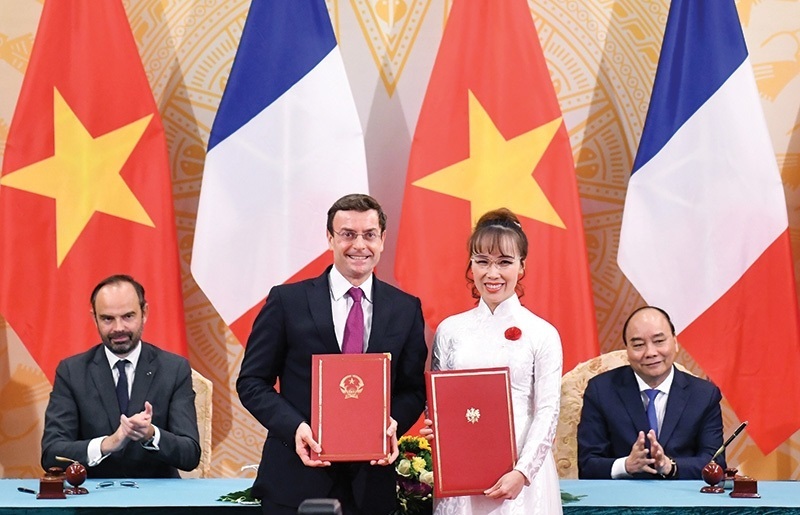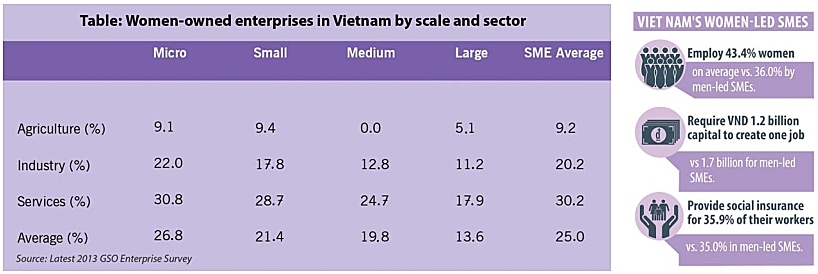 |
|
For years now, the Vietnamese government has recognised the massive contributions that females provide in businesses of all sizes
|
He also suggested that female entrepreneurs continue learning and enhancing their skills, contributing further to the country’s socio-economic development.
Vietnam has been described as a land of extraordinary economic opportunity for women, while at the same time tempered by social constraints. In so many ways, the country has succeeded in its quest to overcome a recent history of colonialism, war, and poverty.
Opening its doors to market forces and outside investment in the 1980s, the country has since taken on the huge challenges of reworking its legal system, divesting the public sector of its vast control over commerce, training its workforce in previously unfamiliar areas, building new industries, engaging with trading partners, and generally transitioning from a poor, agriculture-based society to one that is a vibrant, diverse, and contributing member of the global economy.
The cream of the crop
Renowned names in Vietnamese business such as BRG chairwoman Nguyen Thi Nga, Vietjet CEO Nguyen Thi Phuong Thao, and TH Group founder Thai Huong are the iron women who thrived in the early period of the country’s economic reform. Along with other outstanding businesswomen of their generation, they have begun a revolution and helped create the Vietnamese private sector as it is today.
Nga is currently chairwoman of a series of businesses such as BRG Group, Vietnam Intimex JSC, and Hanoi Tourist Service JSC. In addition, she also holds a large number of properties such as Thang Loi Hotel, Hilton Opera Hanoi, Hilton Garden Inn Hanoi, and five golf courses accompanied by luxury resorts, as well as being a key shareholder in SeABank, Intimex Hanoi and Hapro.
As a chairwoman of such large corporations, Nga’s determination and readiness to fight is always in the mind of this powerful woman. Nga has said that in order to develop the private sector, an important driving force for economic development, nothing compares to the value that we create for society and the lessons that can be learned.
Nga works all day and makes many appearances in different offices, hotels, or even construction sites, but rarely appears in the media and rarely discusses herself. With clear and fair management, Nga strives to create happiness and satisfaction for both her guests and staff. This business culture is clearly expressed in the field of golf, where she is known as a significant and important contributor to the development of the country’s golf industry since its early days in Vietnam with world-class golf courses such as Kings Island, Legend Hills, BRG Ruby Tree and BRG Danang Golf Resorts.
Nguyen Thi Phuong Thao, CEO of Vietjet as well as standing deputy chairwoman of HDBank, is the second billionaire in Vietnam to be named by Forbes. She is also the first and only self-made female billionaire in Southeast Asia, according to Forbes. Thao is ranked 766th on the list of the richest people in the world, with a total net worth of $3.1 billion. Not only is the leader of Vietjet, Thao also holds key positions at banks and enterprises, such as chairwoman of Sovico Holdings and HDBank. Thao ranked 62nd in the Forbes list of the world’s most powerful women in 2016.
She is affectionately called “the princess of aviation” by her cabin crew, and founded the first private airline licensed to operate in Vietnam. By the end of last year, Vietjet continued to record high and sustainable growth in all targets. In 2019, Vietjet plans to sharply improve air transport revenue, continue to expand the international flight network, and increase ancillary revenue proportion.
An enterprising woman who always champions traditional family values, Thai Huong is the founder of TH Group, and considered a trailblazer of the country’s clean and fresh milk revolution. The TH true MILK project began in 2008, and fresh dairy products were launched just two years later, quickly gaining market share and creating a complete change in Vietnam’s fresh dairy industry. This year Huong was named by Forbes among Vietnam’s 50 most influential women.
When asked about these plaudits, she said, “I do not want to be called a powerful woman, I just want to be a woman of my family, but fate has forced me to become a strong businesswoman.”
Last year TH Group opened a $2.7 billion hi-tech dairy farm complex in the Russian district of Volokolamsk. With the total investment capital of $500 million, the project is set to cover more than 50,000 hectares and farm 45,000 cows.
Vietnam’s women-led SMEs
 |
The role of Vietnamese women in business is well recognised. Women are encouraged to participate in economic activities through enterprise-support policies, especially those that concern small- and medium-sized enterprises (SMEs) and female workers. Since 2006, the Gender Equality Law has specified that gender equality provisions must be integrated in legal documents.
A decade ago, Decree No.56/2009/ND-CP also mentioned support to female-owned SMEs. These policies have helped to raise awareness about the importance of such enterprises in Vietnam.
Statistics also show that female-owned SMEs comprise a quarter of the total number of active SMEs in Vietnam, which is a higher percentage than in other countries in South Asia, the Middle East, North Africa, and Sub-Saharan Africa.
These SMEs in Vietnam operate mainly in the services sector (61.4 per cent); employ a higher percentage of female workers than SMEs owned by men (43.4 per cent compared to 36 per cent); and spend less per individual worker on wages than male-owned SMEs (VND1.2 billion compared to VND1.7 billion).
One of the big challenges for Vietnam’s female-owned SMEs is lack of capital. The need for this is common among SME owners, especially women, who sometimes face roadblocks such as facing conscious and unconscious biases.
A study by the International Finance Corporation showed that 70 per cent of female-operated enterprises in developing countries are underserved by financial institutions. The financing gap is estimated at $1.19 billion for such enterprises in Vietnam.
Moreover, despite the global battle for equality, in some places women are still expected to take care of the home and family first ahead of business and socialising, which is a potential avenue to meet clients and build connections. VIR
 In a meeting with female entrepreneurs earlier this year, Prime Minister Nguyen Xuan Phuc reiterated the government’s support for women-led businesses.
In a meeting with female entrepreneurs earlier this year, Prime Minister Nguyen Xuan Phuc reiterated the government’s support for women-led businesses.